- Home
- Carolyn Keene
Lights, Camera . . . Page 6
Lights, Camera . . . Read online
Page 6
“One of the local mechanical geniuses is helping us out,” he continued, smiling at Bess, “so we hope to be back to full power soon. Meanwhile, I’m changing the schedule slightly. It’s nine forty-five now.”
A huge belch exploded from my left, and several people at the nearby tables giggled. “Oops, sorry,” Luke murmured with a sheepish smile. “Shouldn’t have had that second plate, I guess.” He ducked his head down and burped again into his napkin.
“At eleven we’ll rehearse scene twenty-one at the Rackham cabin in the woods. I need all cast and crew for that scene to report to the shuttles in one hour. Don’t be late, guys. We want to do some light takes with the noon sun.” He started to leave the little stage, but paused for a moment, looking down at someone sitting at the table in front.
“Hey, are you feeling all right? You don’t look so . . .” His words trailed off, then burst through the bullhorn again. “We need help up here!” he yelled, jumping off the stage. I stood up.
“Someone’s having a heart attack!” Morris yelled. “Medic!”
I started toward the front of the hall. I’m certified in CPR, and I knew I might need to put some of that training to use. People around the room began jumping up and crowding around the area where Morris stood. George tapped 911 into her cell phone.
I’d only gone a couple of yards when I heard Bess’s voice behind me. “Nancy! Wait,” she called. “It’s Luther!”
I suddenly understood what people meant when they said they “stopped cold.” When I heard Bess’s voice, I felt a chill rattle down my back. I rushed back to the table. Luther was doubled over in his chair and his face had turned a pale greenish gray. With a grinding groan, he dropped off the chair onto his knees. Then he crumpled to the floor.
Cut!
Luther!” I knelt beside him. His face was still an ashy color, but his eyes were open. “My stomach,” he moaned. “Terrible cramp . . . Really hurts.”
“Get one of the medics over here,” I told George. “He needs help right away.”
As George raced off to find one of the on-site medical staffers, I heard another groan nearby. Luke Alvarez tumbled to the floor, overturning his chair with a metallic clang.
“Nancy, there’s something awful going on,” Bess said. “Lots of people are getting sick. A few are even unconscious.”
“It looks like food poisoning,” I told her. “Check on Luke, will you? Just try to keep him comfortable. If he’s chilled, throw a jacket or a tablecloth over him. Don’t give him anything to eat or drink—not even water.”
Near the entrance Morris and his security team were working with the company doctor and nurse to set up triage. They grouped all those who had become ill so that when the ambulances arrived, the sickest people would be treated first.
For the second time in two days, I heard emergency vehicle sirens driving into the compound. Within minutes George returned with one of the emergency medical technicians—EMTs—who’d arrived in an ambulance. I left Bess with the EMT to care for Luke and Luther, and asked George to come with me. We headed first for the kitchen. Grabbing bags of small plastic cups and lids, we went back out to the serving tables and the breakfast buffet.
“We need two sets of samples from everything,” I told George. “Everything on the buffet: eggs, sausage, yogurt, waffles, cream cheese, burritos, fruit, protein smoothies—even the bagels and sweet rolls, the syrup and salsa, the mustard and the water. We need a set for the paramedics, and I want one set for me.”
I knew it would be important to have the samples so that doctors could determine just what type of food poisoning everyone had contracted. It would also help determine what medicines and treatments to use.
We worked quickly, spooning samples into the cups and labeling them. Then we snapped on the lids and dropped the cups into two bags. By the time we’d finished, the most seriously ill—including Luther and Luke—had been taken by ambulance to hospitals in the area. Others were being taken by shuttles, and some were evaluated on site and released, with suggestions to see their own doctors for possible treatment.
“What’s going on, Nancy?” George asked when we had finished giving all the samples to the EMTs. “Was this just bad food, or are we looking at more sabotage here?”
“We’re going to find out soon, I hope,” I answered. “That’s why I’m getting my own samples. One set’s for the doctors, one’s for the criminal investigators.”
“So your instincts are telling you this was intentional.”
“My instincts are telling me to not take anything for granted, and to consider this a crime until I find out the truth. If this poisoning was intentional, whoever is doing this has crossed the line.”
“I fired the caterers,” Morris said, joining us as we watched the last vehicles leave for town. The three of us took seats at one of the tables. “They said they weren’t to blame, but I can’t take any chances. It’s hard enough to get insurance for this production as it is.”
“I agree,” I said. “Even if they were supercareful with their refrigeration and preparation, it looks like some-thing—or someone—got to the food. So that means they weren’t careful enough about keeping everything clean, or their security wasn’t tight enough.”
Morris sighed and nodded. “I see you’re thinking the same thing I am. It was no accident.” He didn’t wait for a response. “Nancy, we have to get this figured out. The doctors have shut me down for at least a couple of days. It’ll take that long for the sickest people to get completely well—and that includes some of the stars of the film. Jane says it will also take that long to finish the security investigation. She said there’s an outside chance it wasn’t the food.”
“You mean it might be another kind of infection?”
“Yes, maybe bacteria in the ventilating system or the water, or some virus carried by insects.”
Neither of us mentioned the other possibility—sabotage by the same person or people who damaged all the computers in the compound, and snuffed out all the electricity.
“Do we have to evacuate the compound?” George asked.
“No, the investigators say they can work around us,” Morris answered.
“The best bet is food poisoning, and they should be able to find out if that’s what this is very quickly,” I pointed out. “Then the investigation turns immediately from what to who.”
“Well, shutting down this production for two days is a financial disaster,” Morris said. “But I’m not giving up yet. I’m going to spend that time trying to raise more money. If I don’t get it, the shutdown might be permanent.”
“I should have all the computers online by tomorrow,” George promised. “And Bess said she’d have the generators hitched together before then.”
“That’s true,” Bess said, walking up. “Maybe sooner. Boy, this food poisoning was awful, wasn’t it? I’m so glad we didn’t eat any breakfast.”
“Me too,” Morris said. “I’d been so busy working out the new schedule with Rita, I hadn’t eaten yet either. I had planned on loading up a plate after I’d finished with the announcements. We were lucky.”
“Now that you fired the caterers, what are you going to do about food up here?” George asked.
“I hadn’t even thought about it yet,” Morris said.
“I work with my mother,” George said. “She’s the best caterer in River Heights. And she’s never poisoned her customers,” she added with a crooked smile. “I’ll check with her if you want.”
“That would be great,” Morris said. “It’s just one less thing I have to worry about. If she’s got the time to take us on, have her get the details from Rita.” He stood up. “Thanks again for all your help, girls. Keep me posted.” His shoulders were slumped as he walked out. I wondered how much more he could handle before he gave up.
“What about the Musketeers?” Bess asked me. “Do you think they’d be capable of some of the stuff that’s been going on? Other than the hidden skunk, of course.”
&n
bsp; “Luther thinks they’re pretty low-key types,” I answered. “Not the kind of ruthless people who’d actually put someone in the hospital with food poisoning. But I still want to talk with them. I was originally scheduled to rehearse with Jake and the horses for part of this afternoon. If that’s still on, I’ll probably stop by the Musketeers’ camp later, or on the way in tomorrow morning.”
I looked at my watch. “It’s a little after noon. I’ve got just enough time to run these food samples in to the lab before my session with Jake. Let’s check back with one another here around four.”
“Sounds good,” George said. “I’m pretty close to breaking through the last electronic wall into the company computers. I might have news to report by then.”
“I should have the generators humming by then too,” Bess said.
Bess and George went off to their tasks, and I went to mine. I drove Bess’s car back to River Heights and the chemistry lab at the university, where a friend of mine was an assistant professor. I’d helped him with a case a few months earlier, so I knew he’d be happy to return the favor. I dumped all the food samples off with him, and he promised to begin checking them right away.
When I got back to the movie compound, I reported to the menagerie. I spent a couple of hours working with Jake. He showed me how to ride on the bouncy seat of a buckboard without looking ridiculous. He also let me take the reins a couple of times for an exciting run along the bluff trail.
After scheduling another session for the next day, I checked in with the security team. Both Jane and Dave were there.
“Hi, Nancy.” Jane greeted me with a warm smile. “What have you got for us?”
“I was hoping you had something for me,” I answered. “Have you heard anything from the fire investigators? Do they know whether the generator blowout was an accident or not?”
“We’re pretty certain it wasn’t,” Jane said. “My key didn’t work in the padlock because it wasn’t the original lock. The company had not bought a new one, so we think it was put on there by the trespasser.”
“To cover up the fact that someone had been inside,” I guessed. “Anyone who glanced at the door and saw the padlock would assume everything was okay.”
“The new lock is very similar to the old one,” Dave added. “We compared advertising-brochure photos. But it’s a pretty common lock—it’d be hard to trace it to its point of purchase.”
“Apparently the first lock was cut open,” Jane said. “We found shavings of metal matching the original lock on the ground beneath the doors. We also found traces of blood there.”
“There was blood inside the semi, too, in the padding near the generator,” I pointed out.
“That’s right,” Dave said. He seemed surprised. “So we could be looking for someone who already had an injury—or someone who scraped or cut their hand or finger while they were cutting the lock open.”
“And it has to be an inside job,” I said, “by someone who knew the location of the generator and when it would be deserted.”
“Someone who didn’t have a key to the lock,” Jane continued. “We have one here, the maintenance crew has one, and Morris has one somewhere.”
“He couldn’t locate it this morning, though,” Dave pointed out.
“The culprit had time to plan everything very carefully,” I continued, “which meant getting a backup padlock similar to the original. Have you noticed whether anyone in the cast or crew has a fresh wound, aside from Morris’s skunk bite?”
“Jake Brigham has a half dozen new wounds a day,” Dave said. “Animal bites, scrapes and cuts from leashes and reins, punctures from bird talons.”
“One of the carpenters stabbed his palm with a nail building the boat set,” Jane offered. “Rita sliced her finger with a drafting knife when she was making the new schedule board. Lee Chang pinched his wrist tightening a camera he’d mounted on a cherry picker. And Althea broke her nail grabbing her laptop when it started to fall. She saved the computer, but tore half her nail off in the process.”
“I guess the question is, is there anyone in the company who couldn’t have bled on the generator,” I said. “This seems to be a company of the walking wounded.”
“In more ways than one,” Jane said.
We talked a little about scheduling a good time for a visit to the Muskoka Musketeers’ protest camp, and I left.
At four fifteen I walked to the mess hall. A yellow crime tape was strung across the door, barring anyone from going in. Next door George’s mother had set up a tent to use until the original mess hall was cleared for food preparation again. Bess was waiting for me there.
“George said to go ahead and eat,” she told me. “She’ll be here later.”
Mrs. Fayne’s food was not only safer than the previous caterer’s, it was much better. Over burgers and fries, Bess and I caught up.
“I’ve got good news,” Bess said. “We’ll have full power in about an hour. I’m waiting for a part that’s being constructed in the metal shop.”
“Great job!” I told her.
“I’m looking forward to getting started on the carpentry. There’s a lot of lost time to make up.”
“Plus it’s more fun working with a shop crew than being all by yourself in that semi, I’ll bet.”
“It is,” she said. Then she put down her burger. “You know, there’s a lot more work to do than just set building. Nancy, the morale is pretty low. I found that out when I was in the metal shop working on a generator part. More of the craftsman are talking about walking out.”
“Because of the problems getting the film off the ground?” I guessed.
“Yes, but Morris is part of it too. Some of the crew think that he might be in over his head, and that’s made him a little desperate.”
“And they think he’s causing the problems?”
“Well, one of the rumors I’ve heard is that he’s gotten so far over budget already—without any footage even shot yet—that he’s in a lot of trouble personally. Some people think he’s being forced to sabotage his own production as a way of getting out of the project without destroying his reputation in the industry.”
“I’m not sure I believe that,” I told Bess. “But I’ve been fooled before.” I made it a rule long ago to follow every lead, no matter how strange it seems. “Sounds like it’s time to talk to Morris.”
Just then my cell phone rang. It was my friend at the Riverview lab. We talked for a few moments, then I closed my phone.
“It was definitely food poisoning,” I reported to Bess. “Salmonella. No way to tell whether it was intentional, of course, but he said there was enough to make a small army really sick. We’re lucky there weren’t more people stricken.”
“Right,” Bess agreed. “And speaking of food, I have a message to pass on. Harold Safer is looking for you.”
Mr. Safer loves the theater and show business. “I’m surprised it took him this long to get out here. What did he want?”
“He brought a sample platter for Aunt Louise’s catering, but I saw him hanging around Herman Houseman’s trailer. I don’t think his main goal is selling cheese.”
“Come to think of it, Mr. Houseman made his name on Broadway. I know he’s gotten at least a couple of Tony Awards. That’s enough to send Mr. Safer totally into orbit. Why did he want to see me?”
“Nancy, you’re not just one of the workers out here. You’re in the cast—one of the actual actors! He probably figures you’re his best bet for an introduction to Herman Houseman.”
“You’re probably right. I’ll keep an eye out for him.”
When we finished eating, I packed up some of George’s favorite cookies and walked to the security trailer. I told Jane and Dave about my chemist’s report, and left the cookies. Then I headed for the office. I could hear Morris yelling inside as I approached the door.
“Who do you think you are?” he said, “walking in here, telling me how to run my business!”
“Do you think no one h
as heard about the problems you’ve been having out here?” I heard another man say. The voice was familiar, but I couldn’t place it right away. “Protest demonstrations, generator blowups, food poisoning outbreaks—and worst of all, a script full of lies and distortion! This production has become a loose cannon—and it’s aimed right at River Heights.”
“We’ve had some problems, sure,” Morris responded. “But I’ve spent nearly a year planning this film, and it’s going to be as historically accurate as I can make it. Nothing you can say will ever change my mind about that.”
“Don’t be so sure of yourself. There are laws against slander,” the other voice continued. “You’re treading a fine line between portraying history and ruining the name of my family and the name of my corporation.”
When I heard that, I realized who the other man was. When I opened the door, I was face-to-face with Jack M. Halloran, distant relative of the Rack-hams and CEO of Rackham Industries. He didn’t even seem to see me. Anger blazed from his eyes, and he wheeled back around to face Morris.
“Shut down this production,” he warned. “Or I will!”
Stunt Double
Come on, Jack,” Morris said. He had dropped his angry tone and sounded now like he was talking to an old friend. “You don’t mean that. You know we’re trying to do the best job possible on this film—to make it not only exciting, but accurate. We’re not out to sensationalize your family’s history. I thought we had an understanding.”
“Yeah? Well, understand this: Pack up and get out—or this will be your last production.” Jack Halloran spun around again, and for the first time, he seemed to notice me standing in the office doorway. He’s a big man; he looks as if he could swing a few anvils around himself. And just then he looked very angry as well.
“Mr. Halloran, hello,” I said quietly. He seemed startled to hear my voice as he aimed his glare right into my eyes. “I’m Nancy Drew, remember? I haven’t seen you since—”

 The Purple Fingerprint
The Purple Fingerprint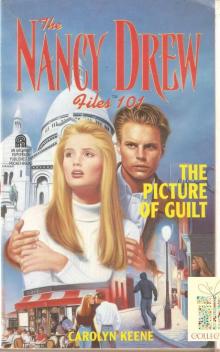 The Picture of Guilt
The Picture of Guilt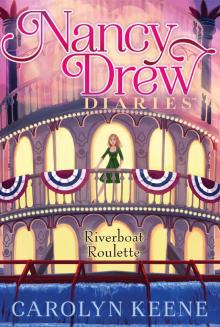 Riverboat Roulette
Riverboat Roulette The Singing Suspects
The Singing Suspects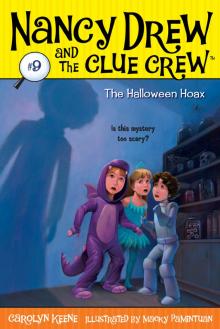 The Halloween Hoax
The Halloween Hoax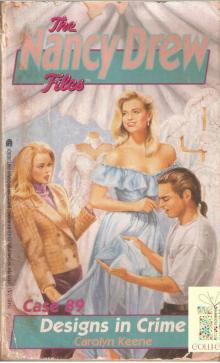 089 Designs in Crime
089 Designs in Crime The Hidden Treasures
The Hidden Treasures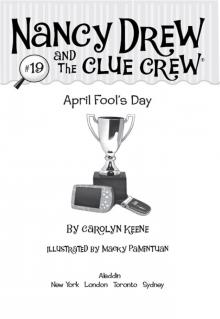 April Fool's Day
April Fool's Day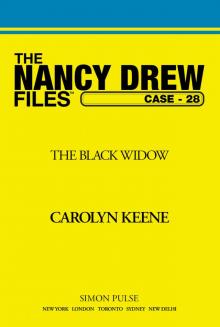 The Black Widow
The Black Widow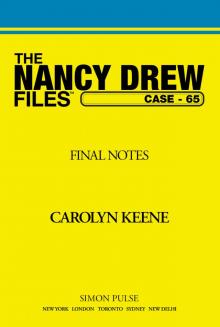 Final Notes
Final Notes The Haunting on Heliotrope Lane
The Haunting on Heliotrope Lane The Runaway Bride
The Runaway Bride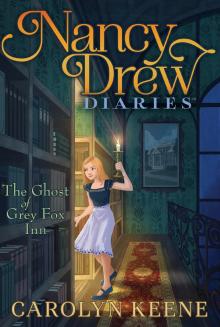 The Ghost of Grey Fox Inn
The Ghost of Grey Fox Inn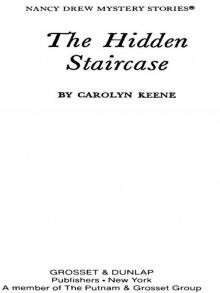 The Hidden Staircase
The Hidden Staircase Mystery of the Winged Lion
Mystery of the Winged Lion Over the Edge
Over the Edge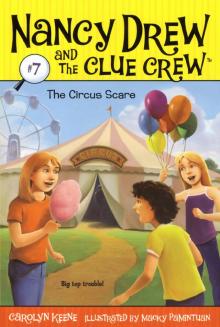 The Circus Scare
The Circus Scare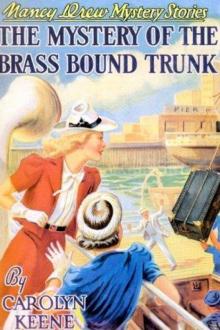 The Mystery of the Brass-Bound Trunk
The Mystery of the Brass-Bound Trunk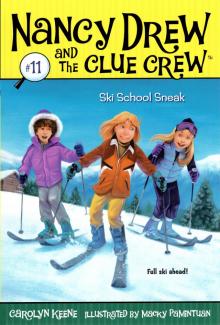 Ski School Sneak
Ski School Sneak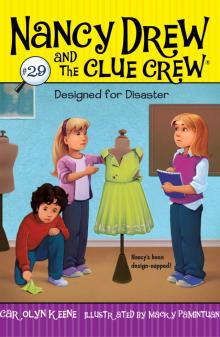 Designed for Disaster
Designed for Disaster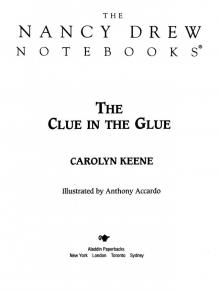 The Clue in the Glue
The Clue in the Glue Cold as Ice
Cold as Ice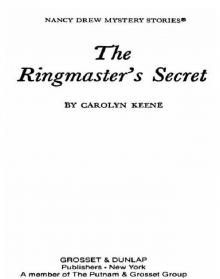 The Ringmaster's Secret
The Ringmaster's Secret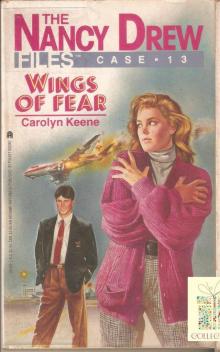 013 Wings of Fear
013 Wings of Fear The Secret of Shadow Ranch
The Secret of Shadow Ranch Not Nice on Ice
Not Nice on Ice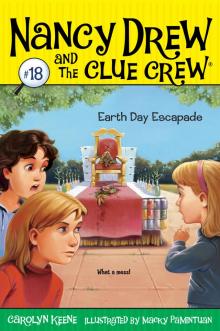 Earth Day Escapade
Earth Day Escapade Mystery of Crocodile Island
Mystery of Crocodile Island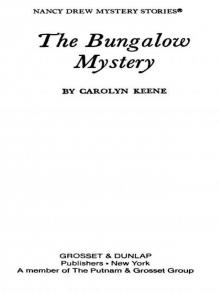 The Bungalow Mystery
The Bungalow Mystery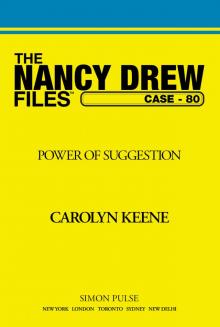 Power of Suggestion
Power of Suggestion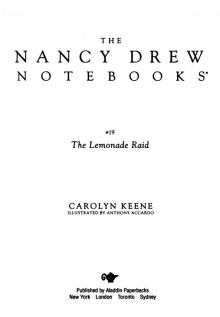 The Lemonade Raid
The Lemonade Raid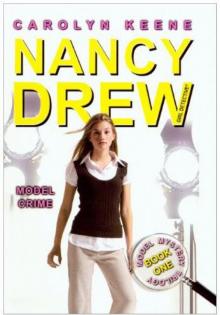 Model Crime
Model Crime The Lucky Horseshoes
The Lucky Horseshoes The Secret of the Old Clock
The Secret of the Old Clock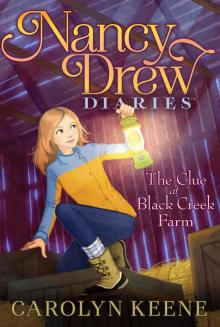 The Clue at Black Creek Farm
The Clue at Black Creek Farm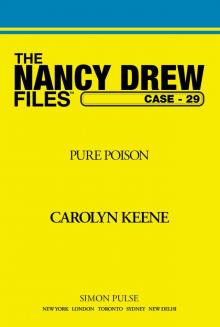 Pure Poison
Pure Poison Nobody's Business
Nobody's Business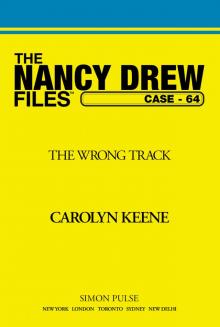 Wrong Track
Wrong Track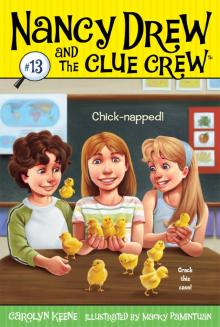 Chick-Napped!
Chick-Napped!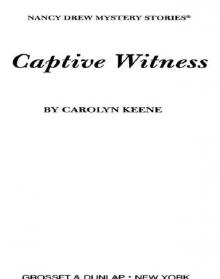 Captive Witness
Captive Witness If Looks Could Kill
If Looks Could Kill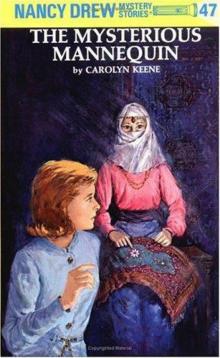 The Mysterious Mannequin
The Mysterious Mannequin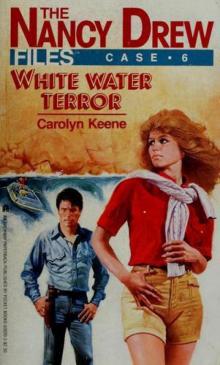 White Water Terror
White Water Terror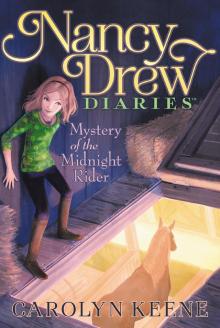 Mystery of the Midnight Rider
Mystery of the Midnight Rider Space Case
Space Case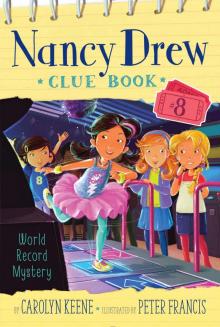 World Record Mystery
World Record Mystery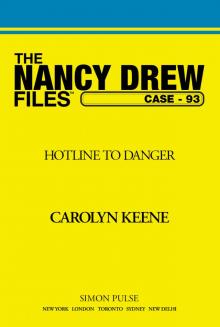 Hotline to Danger
Hotline to Danger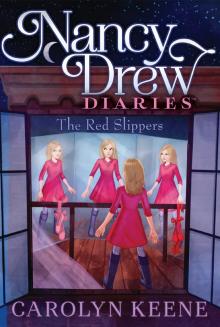 The Red Slippers
The Red Slippers A Crime for Christmas
A Crime for Christmas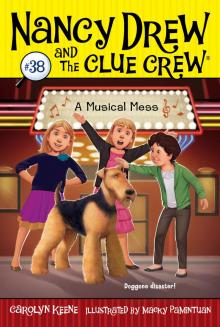 A Musical Mess
A Musical Mess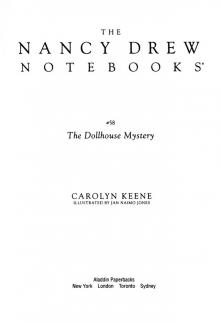 The Dollhouse Mystery
The Dollhouse Mystery Portrait in Crime
Portrait in Crime The Message in the Haunted Mansion
The Message in the Haunted Mansion Playing With Fire
Playing With Fire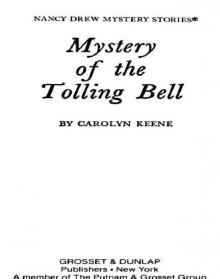 Mystery of the Tolling Bell
Mystery of the Tolling Bell Cutting Edge
Cutting Edge The Gumdrop Ghost
The Gumdrop Ghost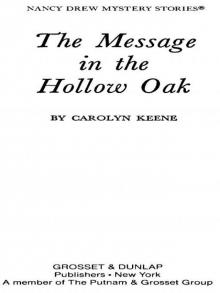 The Message in the Hollow Oak
The Message in the Hollow Oak Trial by Fire
Trial by Fire Mystery at Moorsea Manor
Mystery at Moorsea Manor Princess on Parade
Princess on Parade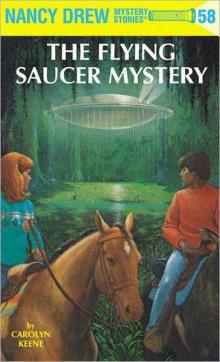 The Flying Saucer Mystery
The Flying Saucer Mystery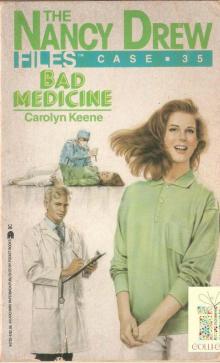 035 Bad Medicine
035 Bad Medicine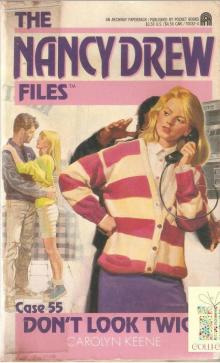 055 Don't Look Twice
055 Don't Look Twice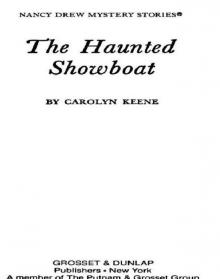 The Haunted Showboat
The Haunted Showboat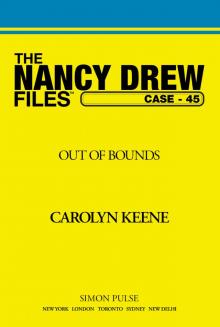 Out of Bounds
Out of Bounds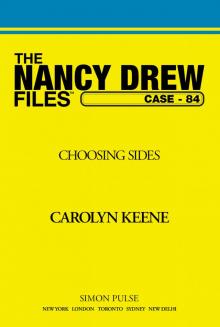 Choosing Sides
Choosing Sides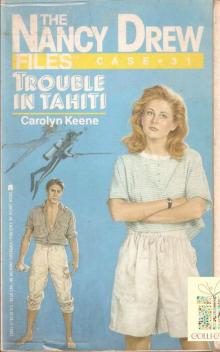 031 Trouble in Tahiti
031 Trouble in Tahiti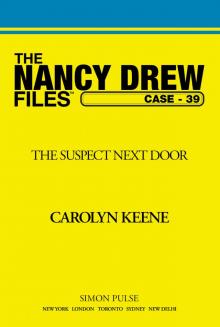 The Suspect Next Door
The Suspect Next Door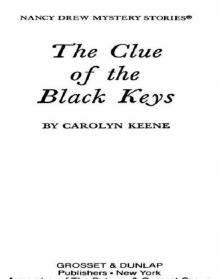 The Clue of the Black Keys
The Clue of the Black Keys The Secret Santa
The Secret Santa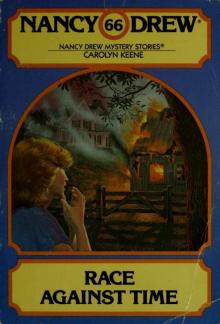 Race Against Time
Race Against Time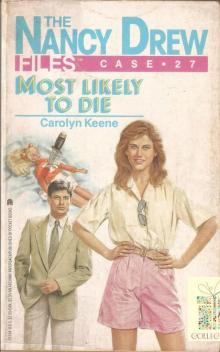 027 Most Likely to Die
027 Most Likely to Die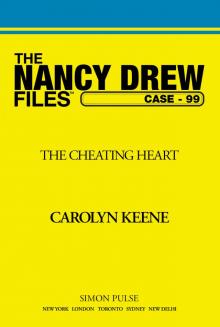 The Cheating Heart
The Cheating Heart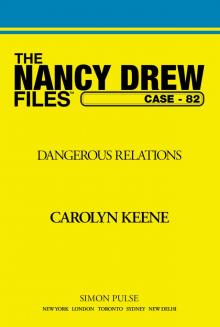 Dangerous Relations
Dangerous Relations It's No Joke!
It's No Joke!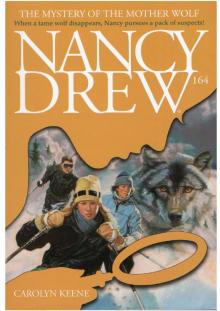 The Mystery of the Mother Wolf
The Mystery of the Mother Wolf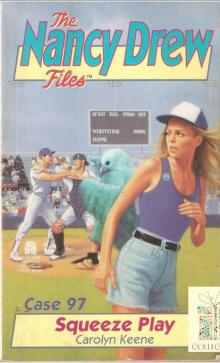 097 Squeeze Play
097 Squeeze Play Secret at Mystic Lake
Secret at Mystic Lake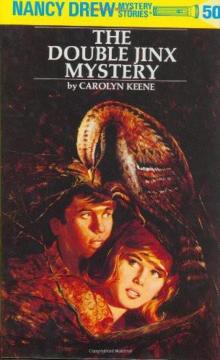 The Double Jinx Mystery
The Double Jinx Mystery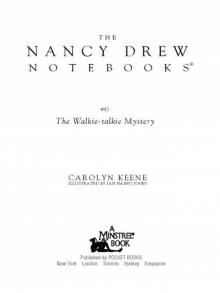 The Walkie Talkie Mystery
The Walkie Talkie Mystery The Case of the Vanishing Veil
The Case of the Vanishing Veil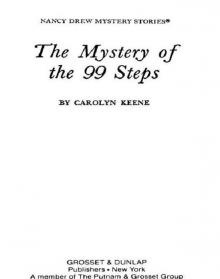 The Mystery of the 99 Steps
The Mystery of the 99 Steps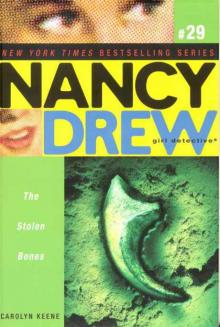 The Stolen Bones
The Stolen Bones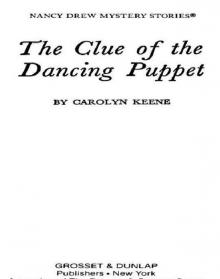 The Clue of the Dancing Puppet
The Clue of the Dancing Puppet The Sand Castle Mystery
The Sand Castle Mystery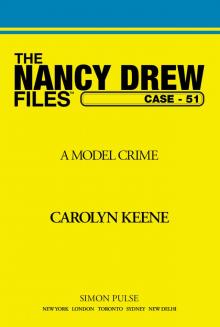 A Model Crime
A Model Crime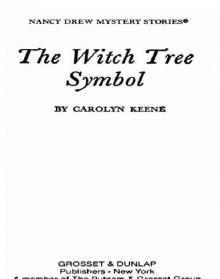 The Witch Tree Symbol
The Witch Tree Symbol The Case of the Artful Crime
The Case of the Artful Crime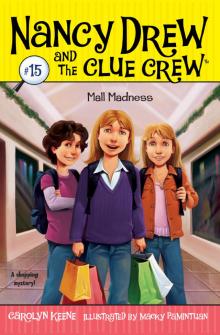 Mall Madness
Mall Madness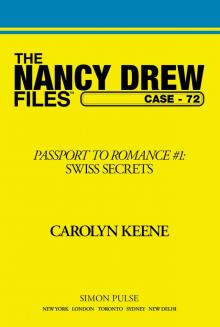 Swiss Secrets
Swiss Secrets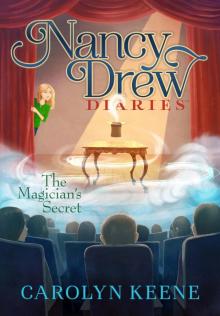 The Magician's Secret
The Magician's Secret Tall, Dark and Deadly
Tall, Dark and Deadly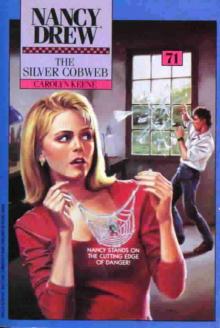 The Silver Cobweb
The Silver Cobweb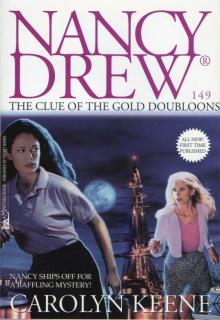 The Clue of the Gold Doubloons
The Clue of the Gold Doubloons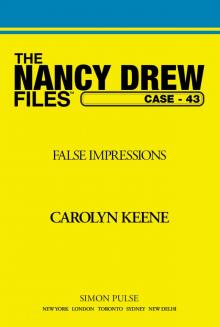 False Impressions
False Impressions Model Suspect
Model Suspect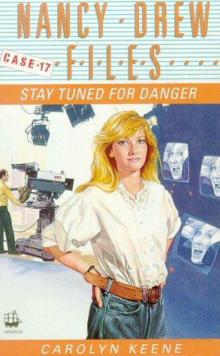 Stay Tuned for Danger
Stay Tuned for Danger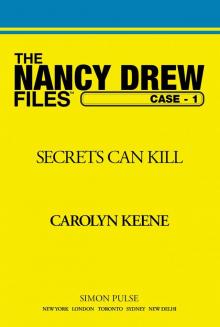 Secrets Can Kill
Secrets Can Kill The Bunny-Hop Hoax
The Bunny-Hop Hoax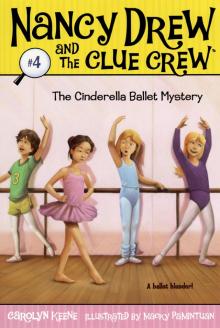 The Cinderella Ballet Mystery
The Cinderella Ballet Mystery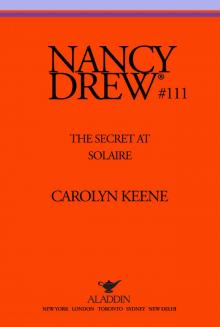 The Secret at Solaire
The Secret at Solaire Trash or Treasure?
Trash or Treasure?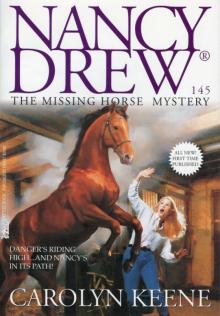 The Missing Horse Mystery
The Missing Horse Mystery The Lost Locket
The Lost Locket The Secret of the Wooden Lady
The Secret of the Wooden Lady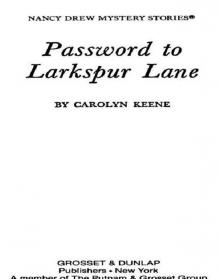 Password to Larkspur Lane
Password to Larkspur Lane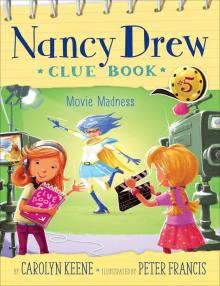 Movie Madness
Movie Madness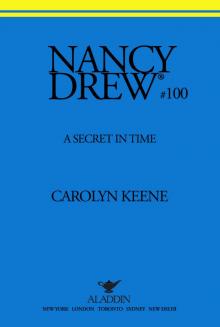 A Secret in Time
A Secret in Time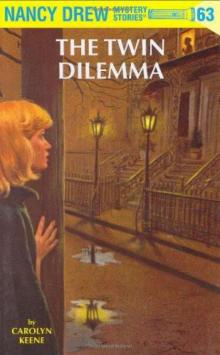 The Twin Dilemma
The Twin Dilemma Candy Is Dandy
Candy Is Dandy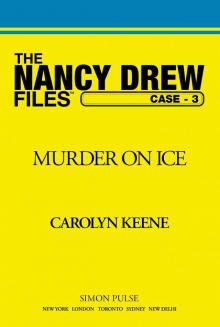 Murder on Ice
Murder on Ice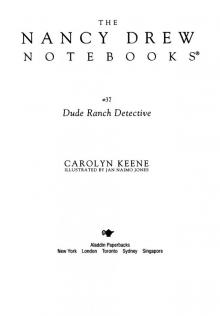 Dude Ranch Detective
Dude Ranch Detective The Slumber Party Secret
The Slumber Party Secret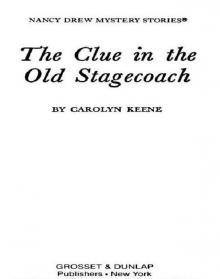 The Clue in the Old Stagecoach
The Clue in the Old Stagecoach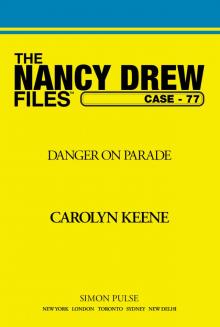 Danger on Parade
Danger on Parade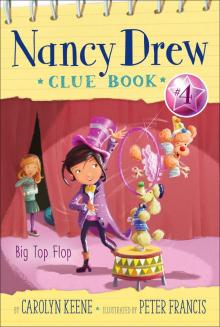 Big Top Flop
Big Top Flop Strangers on a Train
Strangers on a Train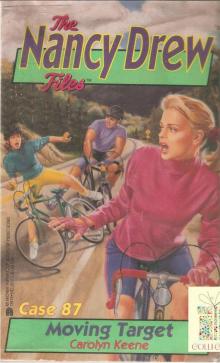 087 Moving Target
087 Moving Target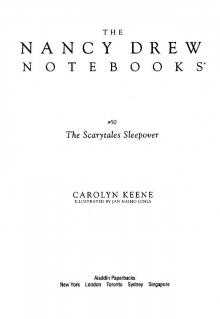 The Scarytales Sleepover
The Scarytales Sleepover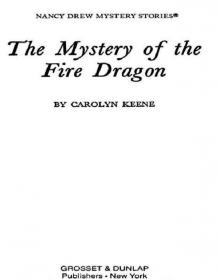 The Mystery of the Fire Dragon
The Mystery of the Fire Dragon The Carousel Mystery
The Carousel Mystery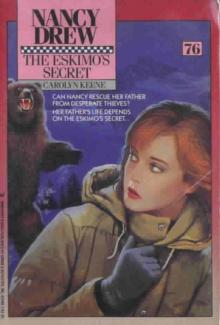 The Eskimo's Secret
The Eskimo's Secret Thrill on the Hill
Thrill on the Hill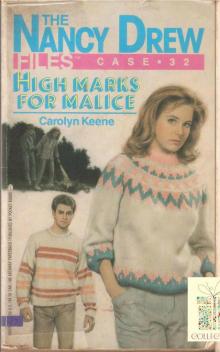 032 High Marks for Malice
032 High Marks for Malice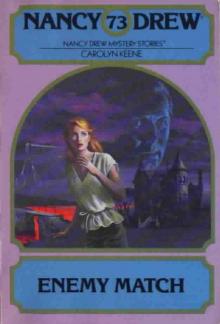 Enemy Match
Enemy Match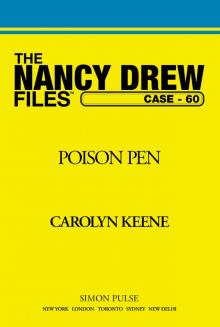 Poison Pen
Poison Pen Lights, Camera . . . Cats!
Lights, Camera . . . Cats! Lost in the Everglades
Lost in the Everglades Strike-Out Scare
Strike-Out Scare Third-Grade Reporter
Third-Grade Reporter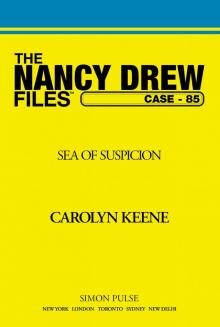 Sea of Suspicion
Sea of Suspicion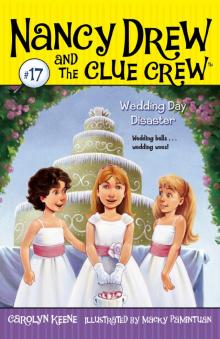 Wedding Day Disaster
Wedding Day Disaster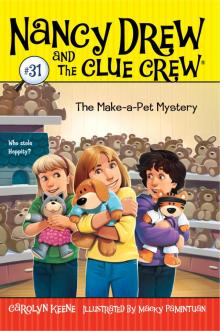 The Make-A-Pet Mystery
The Make-A-Pet Mystery The Ski Slope Mystery
The Ski Slope Mystery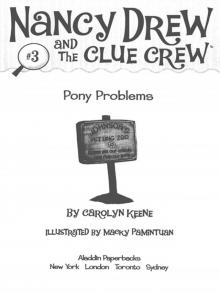 Pony Problems
Pony Problems Candy Kingdom Chaos
Candy Kingdom Chaos The Sign in the Smoke
The Sign in the Smoke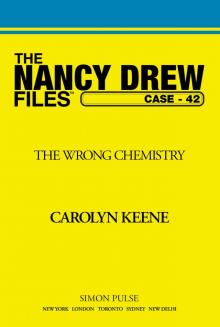 The Wrong Chemistry
The Wrong Chemistry Circus Act
Circus Act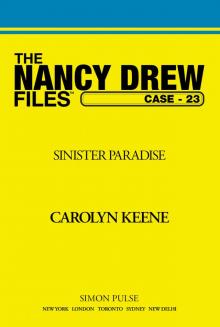 Sinister Paradise
Sinister Paradise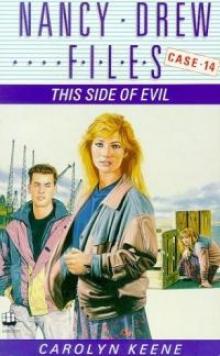 This Side of Evil
This Side of Evil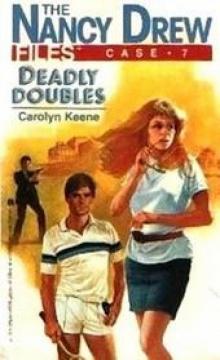 Deadly Doubles
Deadly Doubles The Mystery of the Masked Rider
The Mystery of the Masked Rider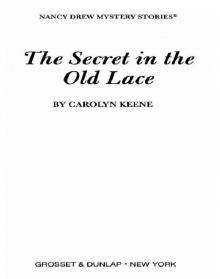 The Secret in the Old Lace
The Secret in the Old Lace The Pen Pal Puzzle
The Pen Pal Puzzle Without a Trace
Without a Trace Whose Pet Is Best?
Whose Pet Is Best?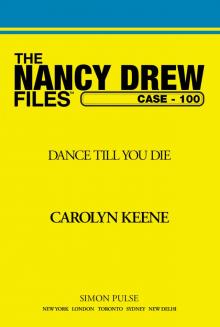 Dance Till You Die
Dance Till You Die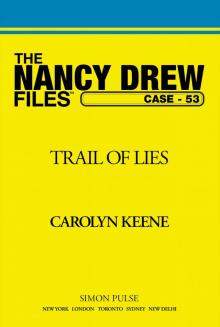 Trail of Lies
Trail of Lies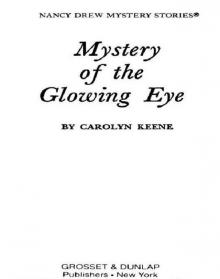 Mystery of the Glowing Eye
Mystery of the Glowing Eye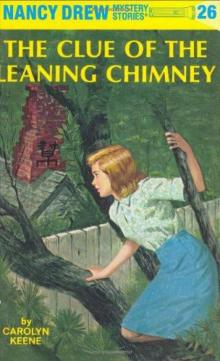 The Clue of the Leaning Chimney
The Clue of the Leaning Chimney The Crook Who Took the Book
The Crook Who Took the Book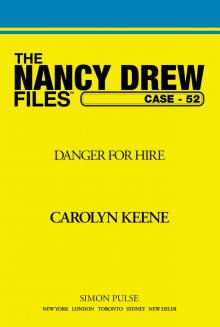 Danger for Hire
Danger for Hire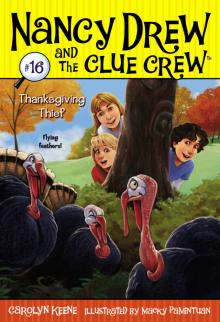 Thanksgiving Thief
Thanksgiving Thief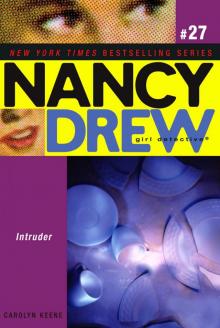 Intruder!
Intruder!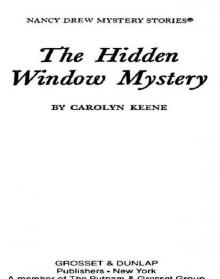 The Hidden Window Mystery
The Hidden Window Mystery Win, Place or Die
Win, Place or Die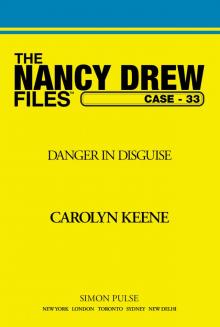 Danger in Disguise
Danger in Disguise The Best Detective
The Best Detective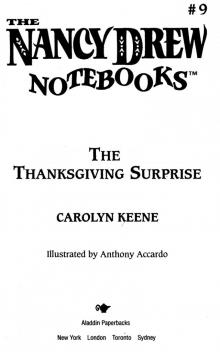 The Thanksgiving Surprise
The Thanksgiving Surprise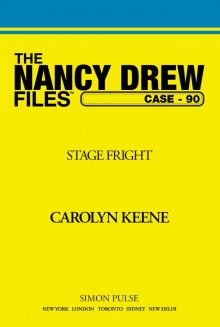 Stage Fright
Stage Fright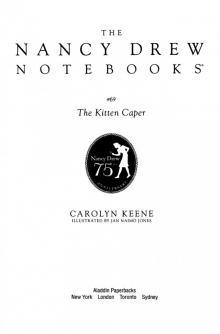 The Kitten Caper
The Kitten Caper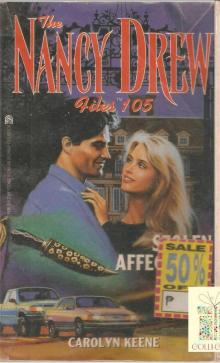 Stolen Affections
Stolen Affections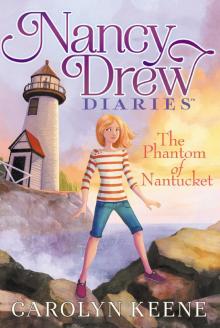 The Phantom of Nantucket
The Phantom of Nantucket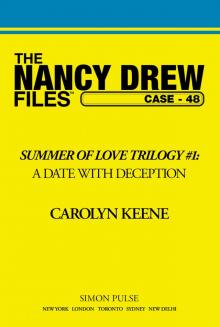 Date With Deception
Date With Deception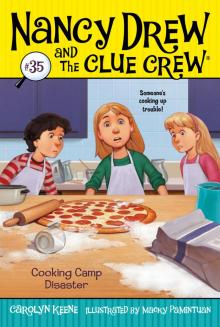 Cooking Camp Disaster
Cooking Camp Disaster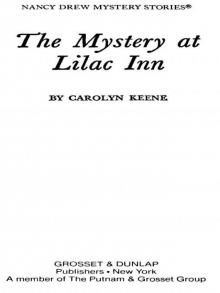 The Mystery at Lilac Inn
The Mystery at Lilac Inn Springtime Crime
Springtime Crime Action!
Action! Into Thin Air
Into Thin Air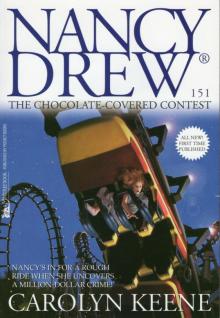 The Chocolate-Covered Contest
The Chocolate-Covered Contest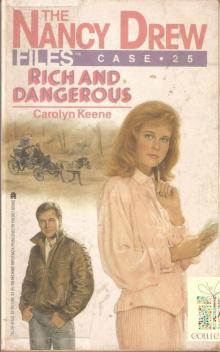 025 Rich and Dangerous
025 Rich and Dangerous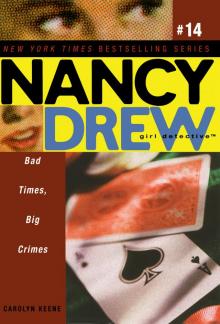 Bad Times, Big Crimes
Bad Times, Big Crimes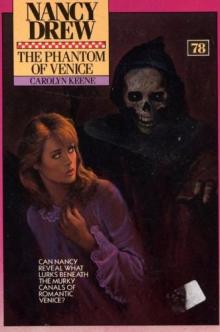 078 The Phantom Of Venice
078 The Phantom Of Venice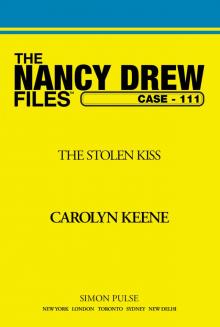 The Stolen Kiss
The Stolen Kiss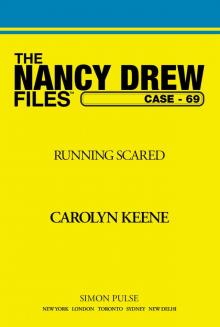 Running Scared
Running Scared The Wedding Gift Goof
The Wedding Gift Goof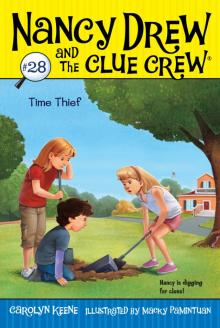 Time Thief
Time Thief The Phantom of Pine Hill
The Phantom of Pine Hill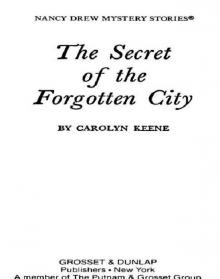 The Secret of the Forgotten City
The Secret of the Forgotten City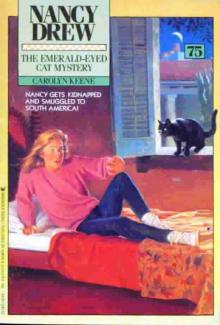 The Emerald-Eyed Cat Mystery
The Emerald-Eyed Cat Mystery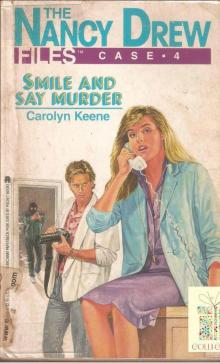 004 Smile and Say Murder
004 Smile and Say Murder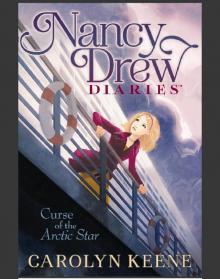 Curse of the Arctic Star
Curse of the Arctic Star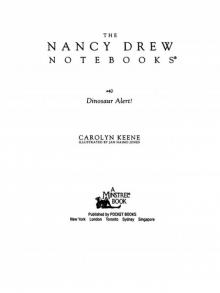 Dinosaur Alert!
Dinosaur Alert!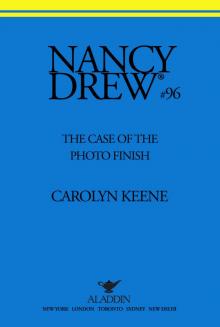 The Case of the Photo Finish
The Case of the Photo Finish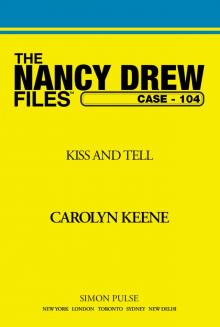 Kiss and Tell
Kiss and Tell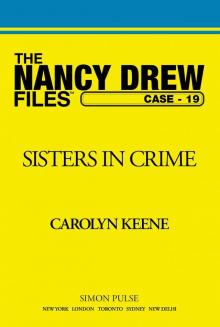 Sisters in Crime
Sisters in Crime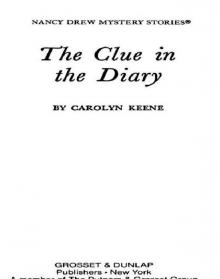 The Clue in the Diary
The Clue in the Diary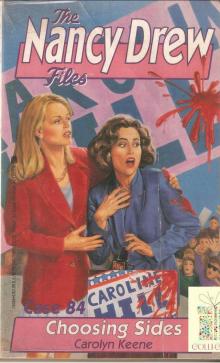 084 Choosing Sides
084 Choosing Sides Haunting of Horse Island
Haunting of Horse Island Vanishing Act
Vanishing Act The Big Island Burglary
The Big Island Burglary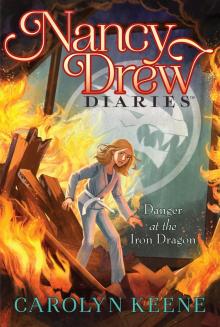 Danger at the Iron Dragon
Danger at the Iron Dragon Pets on Parade
Pets on Parade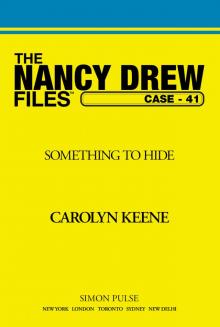 Something to Hide
Something to Hide The Strange Message in the Parchment
The Strange Message in the Parchment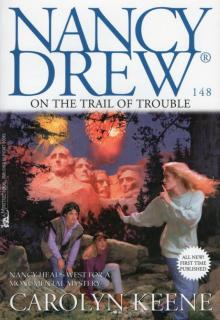 On the Trail of Trouble
On the Trail of Trouble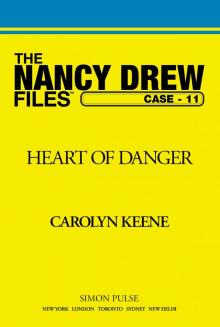 Heart of Danger
Heart of Danger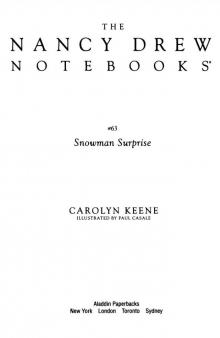 The Snowman Surprise
The Snowman Surprise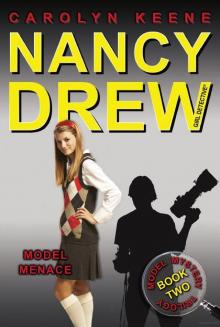 Model Menace
Model Menace Flower Power
Flower Power The Great Goat Gaffe
The Great Goat Gaffe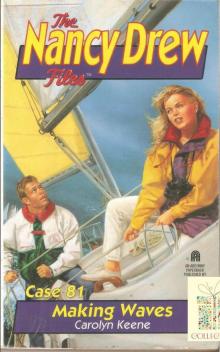 081 Making Waves
081 Making Waves Famous Mistakes
Famous Mistakes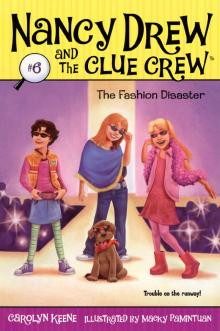 The Fashion Disaster
The Fashion Disaster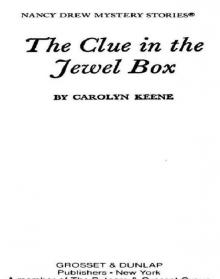 The Clue in the Jewel Box
The Clue in the Jewel Box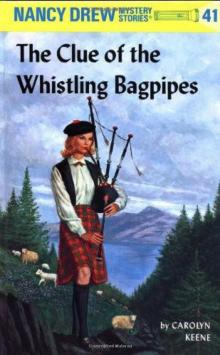 The Clue of the Whistling Bagpipes
The Clue of the Whistling Bagpipes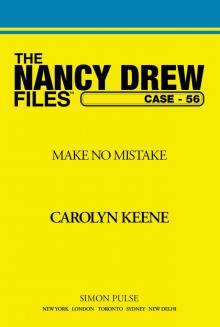 Make No Mistake
Make No Mistake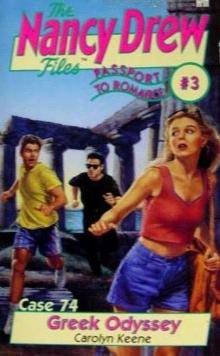 Greek Odyssey
Greek Odyssey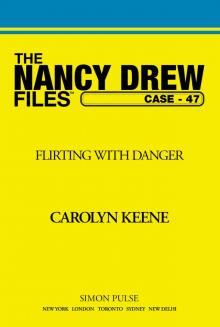 Flirting With Danger
Flirting With Danger Double Take
Double Take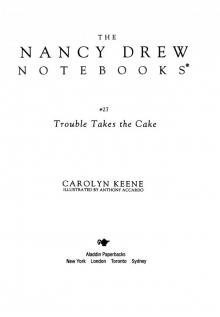 Trouble Takes the Cake
Trouble Takes the Cake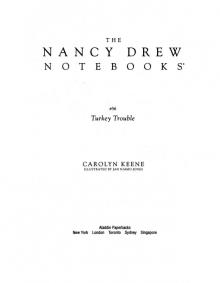 Turkey Trouble
Turkey Trouble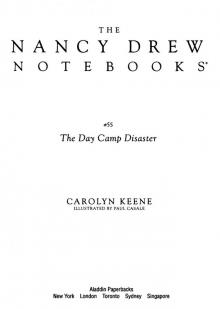 The Day Camp Disaster
The Day Camp Disaster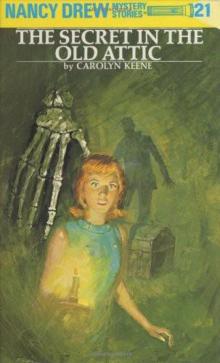 The Secret in the Old Attic
The Secret in the Old Attic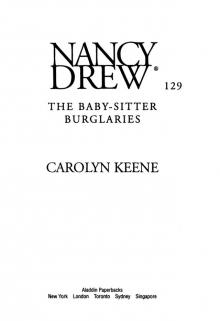 The Baby-Sitter Burglaries
The Baby-Sitter Burglaries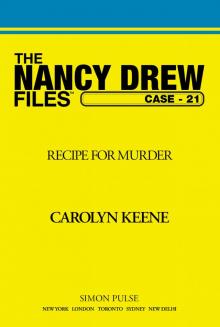 Recipe for Murder
Recipe for Murder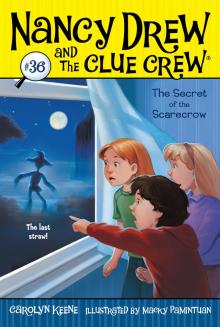 The Secret of the Scarecrow
The Secret of the Scarecrow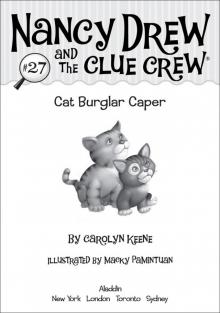 Cat Burglar Caper
Cat Burglar Caper Turkey Trot Plot
Turkey Trot Plot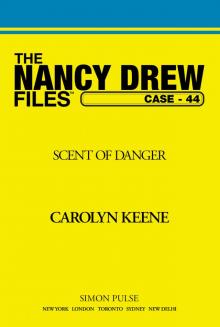 Scent of Danger
Scent of Danger The Clue in the Crossword Cipher
The Clue in the Crossword Cipher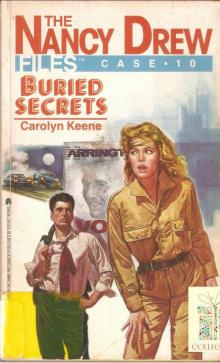 010 Buried Secrets
010 Buried Secrets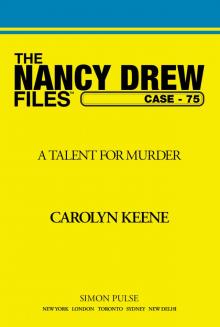 A Talent for Murder
A Talent for Murder The Triple Hoax
The Triple Hoax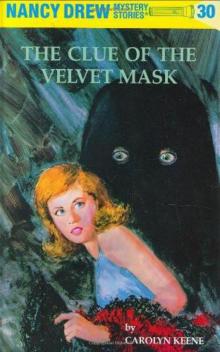 The Clue of the Velvet Mask
The Clue of the Velvet Mask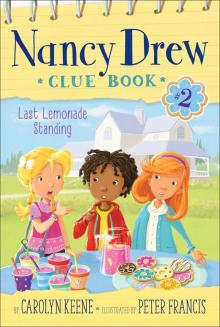 Last Lemonade Standing
Last Lemonade Standing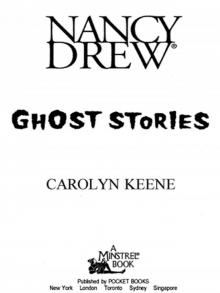 The Ghost of Blackwood Hall
The Ghost of Blackwood Hall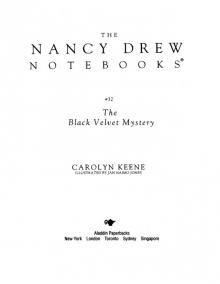 The Black Velvet Mystery
The Black Velvet Mystery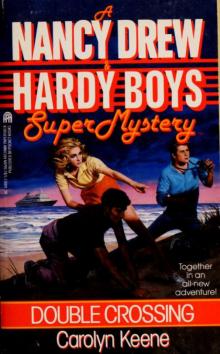 Double Crossing
Double Crossing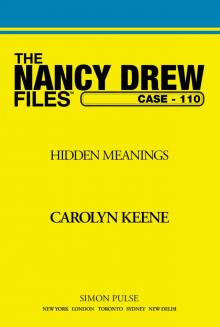 Hidden Meanings
Hidden Meanings Trouble at Camp Treehouse
Trouble at Camp Treehouse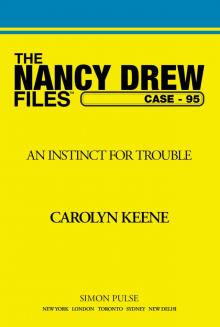 An Instinct for Trouble
An Instinct for Trouble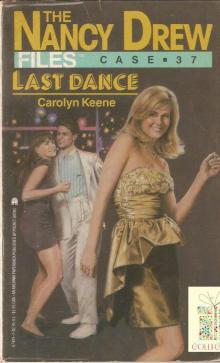 037 Last Dance
037 Last Dance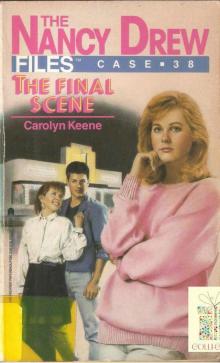 038 The Final Scene
038 The Final Scene Duck Derby Debacle
Duck Derby Debacle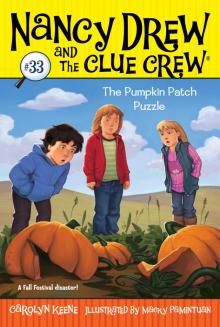 The Pumpkin Patch Puzzle
The Pumpkin Patch Puzzle Hidden Pictures
Hidden Pictures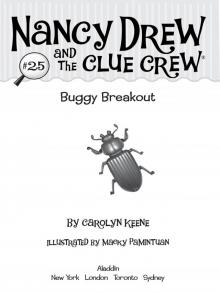 Buggy Breakout
Buggy Breakout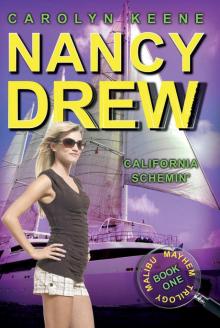 California Schemin'
California Schemin'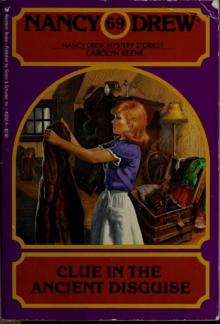 Clue in the Ancient Disguise
Clue in the Ancient Disguise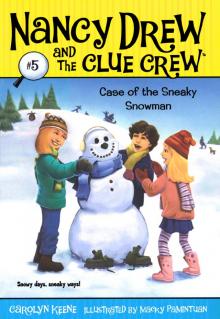 Case of the Sneaky Snowman
Case of the Sneaky Snowman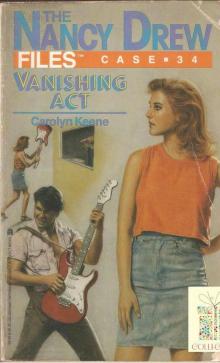 034 Vanishing Act
034 Vanishing Act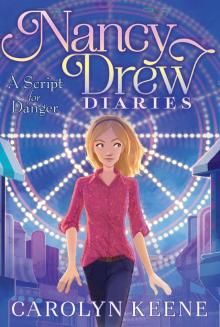 A Script for Danger
A Script for Danger The Flower Show Fiasco
The Flower Show Fiasco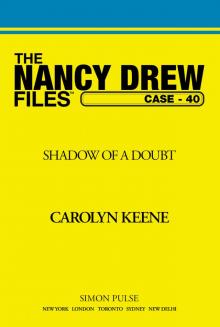 Shadow of a Doubt
Shadow of a Doubt Easy Marks
Easy Marks Alien in the Classroom
Alien in the Classroom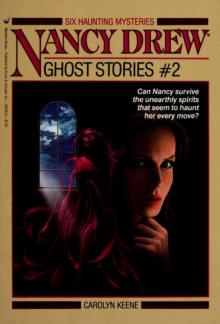 Ghost Stories, #2 (Nancy Drew)
Ghost Stories, #2 (Nancy Drew) The Bike Race Mystery
The Bike Race Mystery False Pretenses
False Pretenses The Kachina Doll Mystery
The Kachina Doll Mystery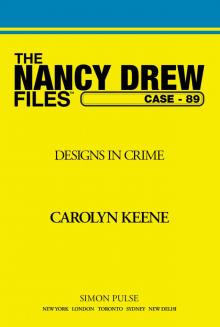 Designs in Crime
Designs in Crime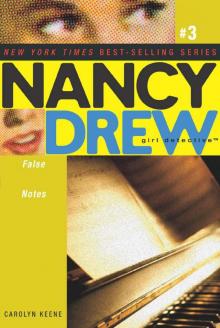 False Notes
False Notes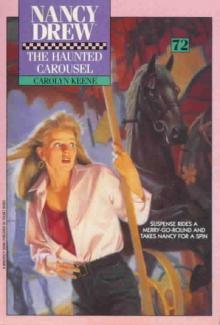 The Haunted Carousel
The Haunted Carousel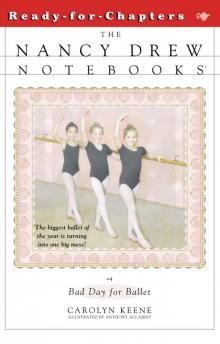 Bad Day for Ballet
Bad Day for Ballet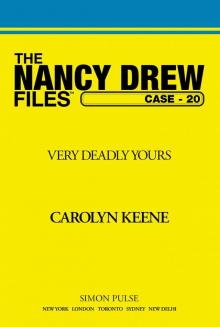 Very Deadly Yours
Very Deadly Yours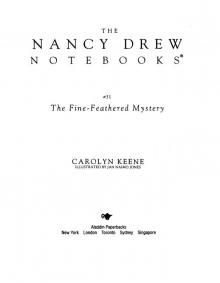 The Fine-Feathered Mystery
The Fine-Feathered Mystery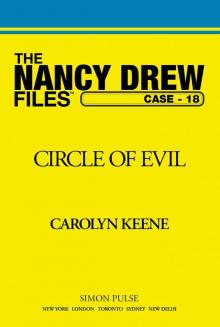 Circle of Evil
Circle of Evil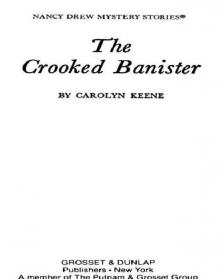 The Crooked Banister
The Crooked Banister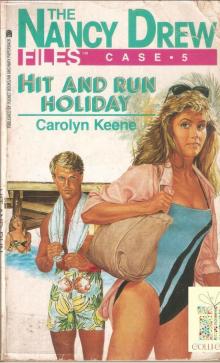 005 Hit and Run Holiday
005 Hit and Run Holiday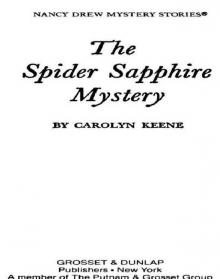 The Spider Sapphire Mystery
The Spider Sapphire Mystery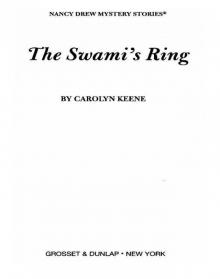 The Swami's Ring
The Swami's Ring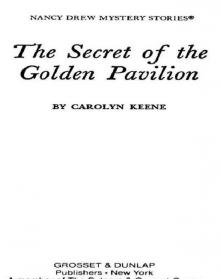 The Secret of the Golden Pavilion
The Secret of the Golden Pavilion Recipe for Trouble
Recipe for Trouble Betrayed by Love
Betrayed by Love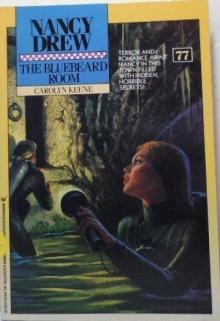 The Bluebeard Room
The Bluebeard Room Sweet Revenge
Sweet Revenge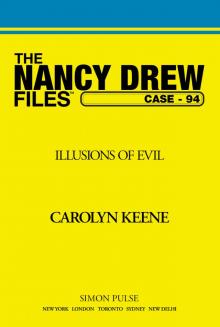 Illusions of Evil
Illusions of Evil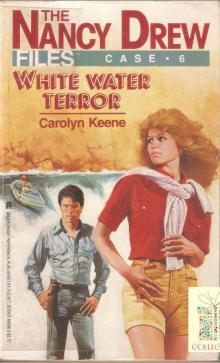 006 White Water Terror
006 White Water Terror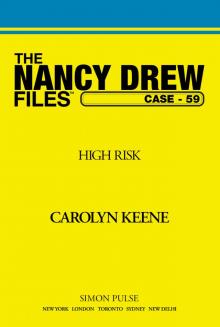 High Risk
High Risk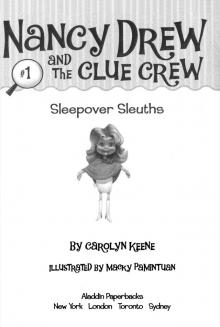 Sleepover Sleuths
Sleepover Sleuths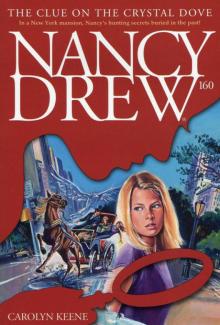 The Clue on the Crystal Dove
The Clue on the Crystal Dove The Stolen Unicorn
The Stolen Unicorn The Professor and the Puzzle
The Professor and the Puzzle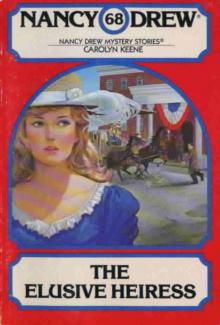 The Elusive Heiress
The Elusive Heiress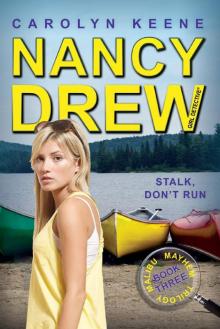 Stalk, Don't Run
Stalk, Don't Run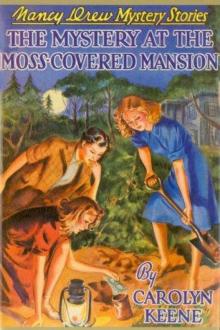 The Mystery at the Moss-Covered Mansion
The Mystery at the Moss-Covered Mansion The Tortoise and the Scare
The Tortoise and the Scare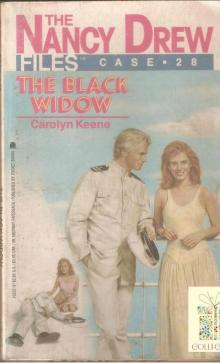 028 The Black Widow
028 The Black Widow Big Worry in Wonderland
Big Worry in Wonderland Crosscurrents
Crosscurrents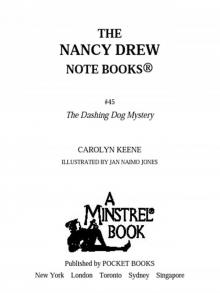 The Dashing Dog Mystery
The Dashing Dog Mystery Fatal Attraction
Fatal Attraction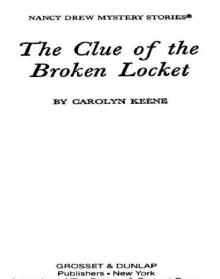 The Clue of the Broken Locket
The Clue of the Broken Locket The Stinky Cheese Surprise
The Stinky Cheese Surprise Mystery of the Ivory Charm
Mystery of the Ivory Charm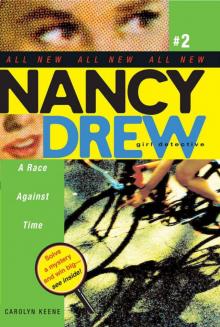 A Race Against Time
A Race Against Time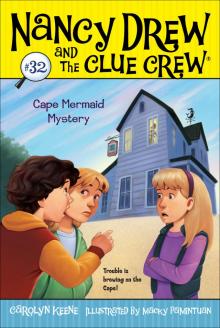 Cape Mermaid Mystery
Cape Mermaid Mystery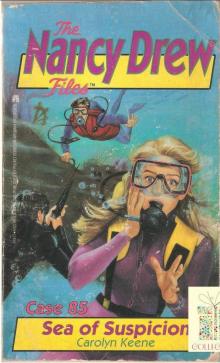 085 Sea of Suspicion
085 Sea of Suspicion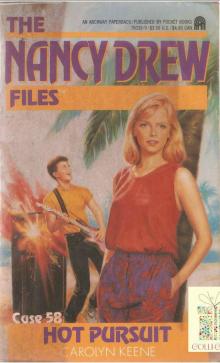 058 Hot Pursuit
058 Hot Pursuit The Secret in the Spooky Woods
The Secret in the Spooky Woods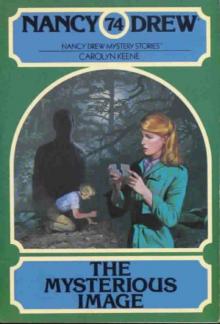 The Mysterious Image
The Mysterious Image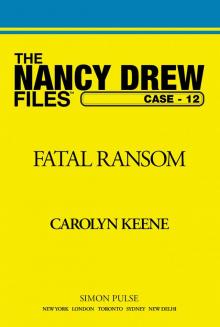 Fatal Ransom
Fatal Ransom The Stolen Show
The Stolen Show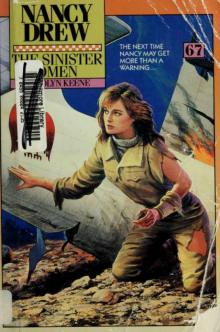 The Sinister Omen
The Sinister Omen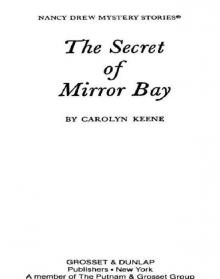 The Secret of Mirror Bay
The Secret of Mirror Bay Rendezvous in Rome
Rendezvous in Rome The Perfect Plot
The Perfect Plot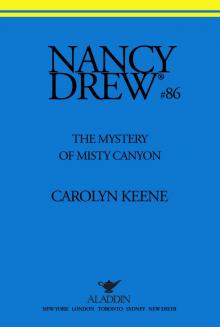 The Mystery of Misty Canyon
The Mystery of Misty Canyon Nancy's Mysterious Letter
Nancy's Mysterious Letter The Snow Queen's Surprise
The Snow Queen's Surprise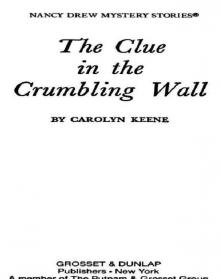 The Clue in the Crumbling Wall
The Clue in the Crumbling Wall Dare at the Fair
Dare at the Fair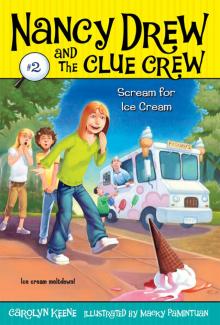 Scream for Ice Cream
Scream for Ice Cream A Star Witness
A Star Witness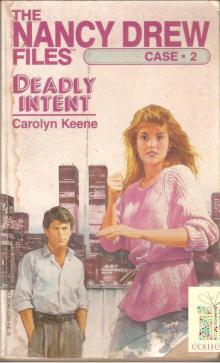 002 Deadly Intent
002 Deadly Intent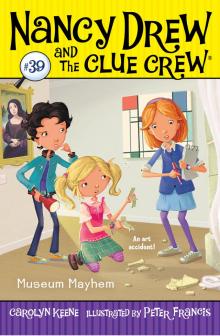 Museum Mayhem
Museum Mayhem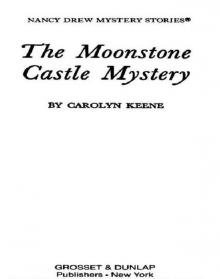 The Moonstone Castle Mystery
The Moonstone Castle Mystery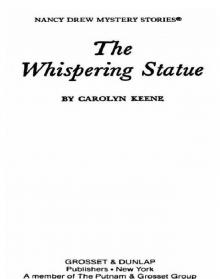 The Whispering Statue
The Whispering Statue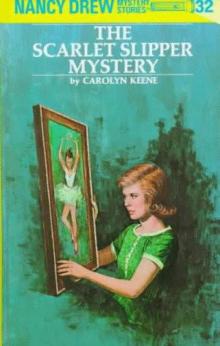 The Scarlet Slipper Mystery
The Scarlet Slipper Mystery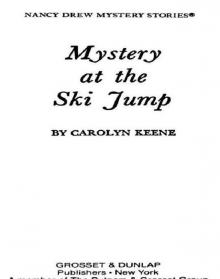 Mystery at the Ski Jump
Mystery at the Ski Jump Hot Pursuit
Hot Pursuit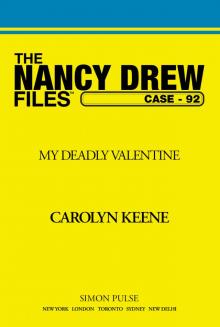 My Deadly Valentine
My Deadly Valentine The Silent Suspect
The Silent Suspect Deep Secrets
Deep Secrets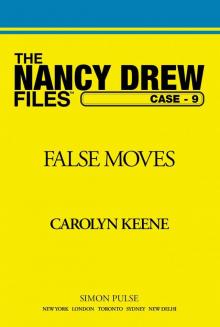 False Moves
False Moves The Zoo Crew
The Zoo Crew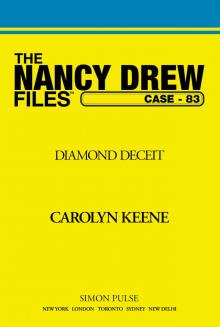 Diamond Deceit
Diamond Deceit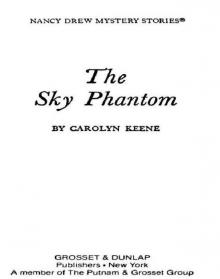 The Sky Phantom
The Sky Phantom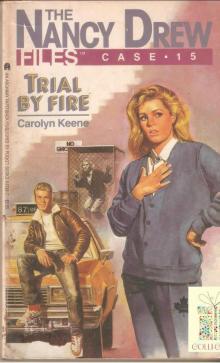 015 Trial by Fire
015 Trial by Fire The Quest of the Missing Map
The Quest of the Missing Map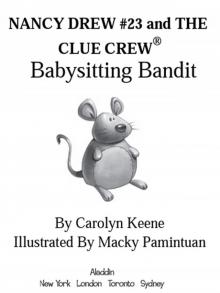 Babysitting Bandit
Babysitting Bandit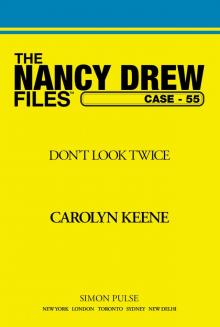 Don't Look Twice
Don't Look Twice Never Say Die
Never Say Die The Soccer Shoe Clue
The Soccer Shoe Clue Pool Party Puzzler
Pool Party Puzzler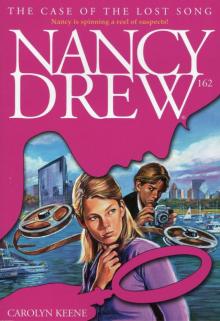 The Case of the Lost Song
The Case of the Lost Song The Apple Bandit
The Apple Bandit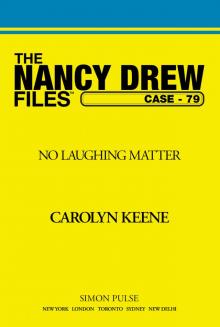 No Laughing Matter
No Laughing Matter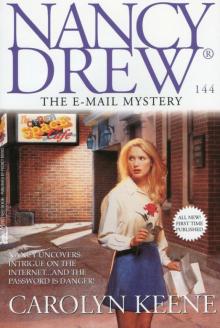 The Thirteenth Pearl
The Thirteenth Pearl Sabotage at Willow Woods
Sabotage at Willow Woods Butterfly Blues
Butterfly Blues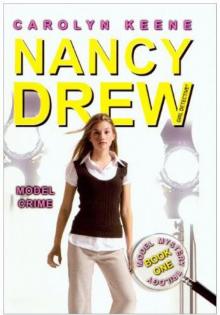 Model Crime 1
Model Crime 1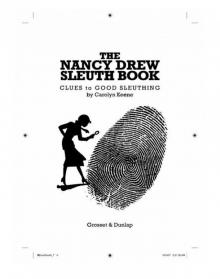 The Nancy Drew Sleuth Book
The Nancy Drew Sleuth Book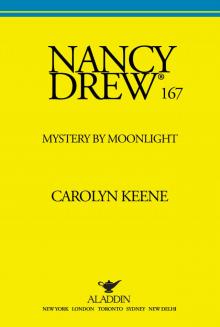 Mystery by Moonlight
Mystery by Moonlight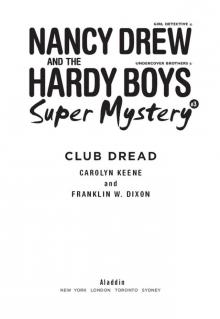 Club Dread
Club Dread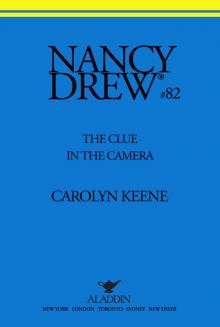 The Clue in the Camera
The Clue in the Camera 118 Betrayed By Love
118 Betrayed By Love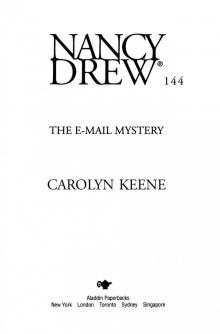 The E-Mail Mystery (Nancy Drew Book 144)
The E-Mail Mystery (Nancy Drew Book 144)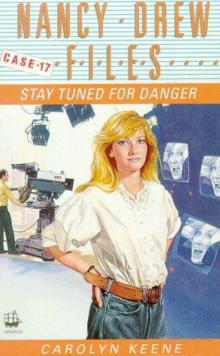 Stay Tuned for Danger: Circle of Evil
Stay Tuned for Danger: Circle of Evil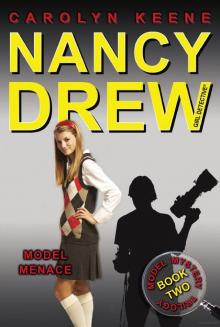 Model Menace 2
Model Menace 2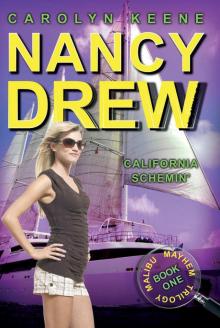 California Schemin': Book One in the Malibu Mayhem Trilogy
California Schemin': Book One in the Malibu Mayhem Trilogy Zoo Clue (Nancy Drew Notebooks)
Zoo Clue (Nancy Drew Notebooks)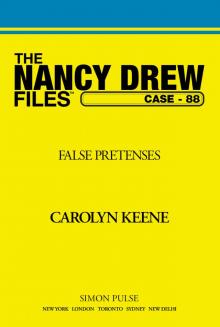 False Pretences
False Pretences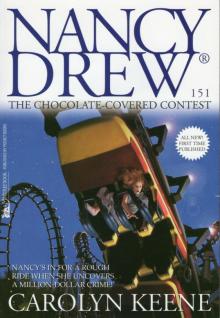 151 The Chocolate-Covered Contest
151 The Chocolate-Covered Contest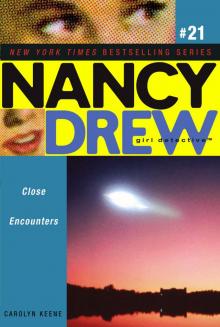 Close Encounters
Close Encounters The Emeral-Eyed Cat Mystery
The Emeral-Eyed Cat Mystery Boo Crew
Boo Crew The Message in the Haunted Mansion (Nancy Drew Book 122)
The Message in the Haunted Mansion (Nancy Drew Book 122) A Nancy Drew Christmas
A Nancy Drew Christmas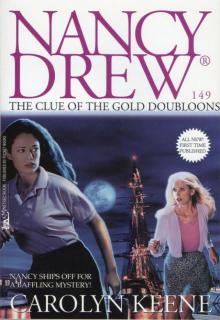 149 The Clue Of The Gold Doubloons
149 The Clue Of The Gold Doubloons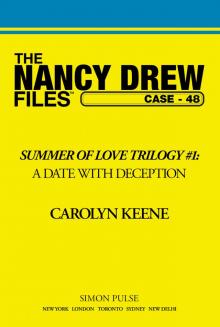 A Date with Deception
A Date with Deception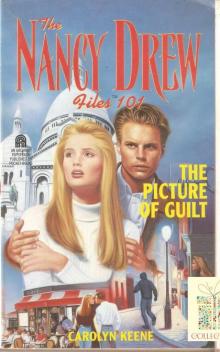 101 The Picture of Guilt
101 The Picture of Guilt The Secret in the Spooky Woods (Nancy Drew Notebooks Book 62)
The Secret in the Spooky Woods (Nancy Drew Notebooks Book 62)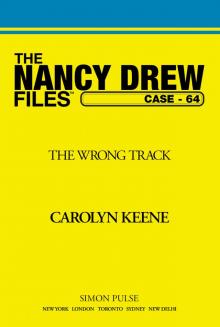 The Wrong Track
The Wrong Track Lights! Camera! Clues!
Lights! Camera! Clues! The Vanishing Act
The Vanishing Act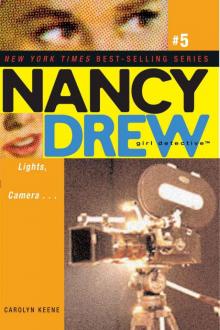 Lights, Camera . . .
Lights, Camera . . . Model Suspect 3
Model Suspect 3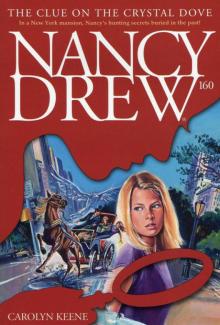 160 The Clue On The Crystal Dove
160 The Clue On The Crystal Dove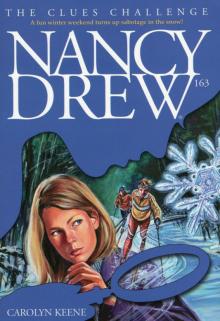 163 The Clues Challenge
163 The Clues Challenge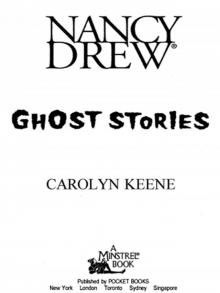 Ghost Stories (Nancy Drew)
Ghost Stories (Nancy Drew) Space Case (Nancy Drew Notebooks Book 61)
Space Case (Nancy Drew Notebooks Book 61)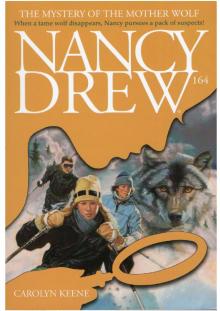 164 The Mystery Of The Mother Wolf
164 The Mystery Of The Mother Wolf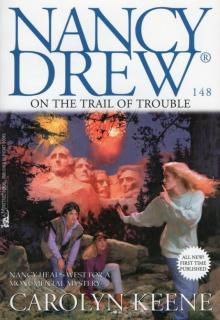 148 On The Trail Of Trouble
148 On The Trail Of Trouble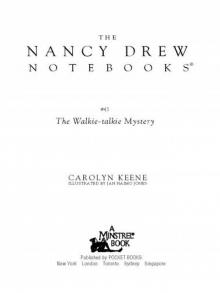 The Walkie-Talkie Mystery
The Walkie-Talkie Mystery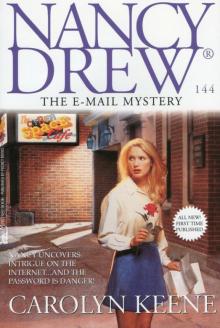 The E-Mail Mystery
The E-Mail Mystery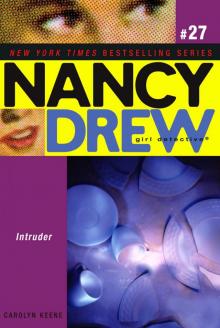 Intruder (Nancy Drew (All New) Girl Detective)
Intruder (Nancy Drew (All New) Girl Detective)![The Stolen Relic [Nancy Drew Girl Detective 007] Read online](http://i1.bookreadfree.com/i2/04/11/the_stolen_relic_nancy_drew_girl_detective_007_preview.jpg) The Stolen Relic [Nancy Drew Girl Detective 007]
The Stolen Relic [Nancy Drew Girl Detective 007]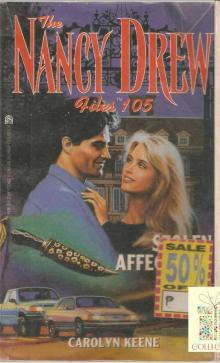 105 Stolen Affections
105 Stolen Affections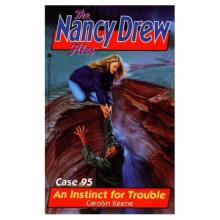 An Instict for Trouble
An Instict for Trouble 161 Lost In The Everglades
161 Lost In The Everglades The Old-Fashioned Mystery
The Old-Fashioned Mystery Perfect Plot
Perfect Plot